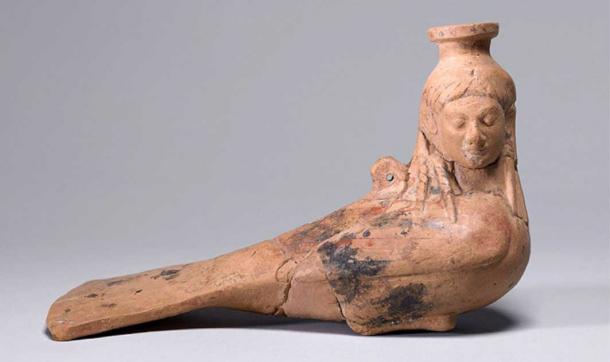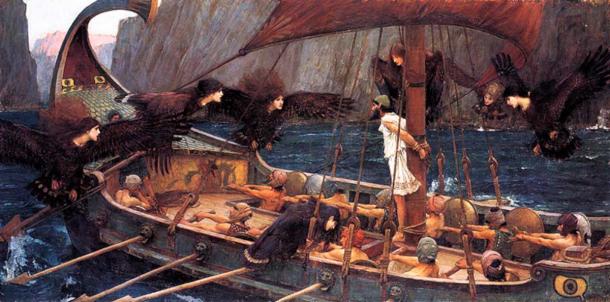Sirens are a type of creature found in ancient Greek mythology. Commonly described as beautiful but dangerous creatures , the sirens are remembered for seducing sailors with their sweet voices, and, by doing so, luring them to their deaths. The sirens have been mentioned by numerous ancient Greek authors. Arguably one of the most famous references regarding the sirens comes from Homer’s Odyssey, in which the hero Odysseus encounters the sirens during his voyage home from Troy.

Terracotta two handed vase or Kylix, decorated with black Sirens. ( Public domain )
Sirens of Greek Mythology in Literature and Art of Ancient Greece
In the many written sources of Greek mythology, the number of sirens, sometimes spelled as seirenes, varied depending on the author who told their mythical story. Homer, for example, mentioned neither the number nor names of the sirens that Odysseus and his companions encountered. Other writers, however, were more descriptive. For instance, some stated that there were two sirens, Aglaopheme and Thelxiepeia, whilst others claimed that there were three of them; Peisinoë, Aglaope and Thelxiepeia or Parthenope, Ligeia and Leucosia.
Neither did the authors of Greek mythology agree with each other regarding the parentage of the sirens. One author, for instance, claimed that the sirens were the daughters of Phorcys (a primordial sea god), whilst another stated that they were the children of Terpsichore (one of the nine Muses). According to one tradition, the sirens were the companions or handmaidens of Persephone, the daughter of Zeus and Demeter.

Ulysses and the Sirens, circa 1868, by Marie-François Firmin Girard. ( Public domain )
After Persephone’s abduction by Hades, the sirens were given wings. According to some authors, wings were requested by the sirens themselves, so that they would be more effective at searching for their mistress. Other authors attributed these wings to a punishment handed down by Demeter, as the sirens had failed to prevent the abduction of Persephone.
In any event, this association with the myth of Persephone’s abduction contributed to the depiction of the sirens by the ancient Greeks. In general, these creatures were depicted as birds with the heads of women. In some instances, the sirens of Greek mythology were also depicted with arms. According to researchers, the sirens (or at least the way they were portrayed) were of Eastern origin (the ancient Egyptian ba , for example, was often depicted as a bird with a human head), and entered Greece during the Orientalizing period of Greek art.

An Archaic perfume vase in the shape of a siren, circa 540 BC. ( Public domain )
Resisting the Sirens’ Seductive Song: The Sirens of the Odyssey
The sirens appear in many ancient Greek myths . One of the most famous of stories about the sirens can be found in Homer’s Odyssey. In this piece of literature, the sirens are said to live on an island near Scylla and Charybdis, and the hero Odysseus was warned about them by Circe.
In order to stop his men from being seduced by the sirens’ singing, Odysseus had his men block their ears with wax. As the hero wanted to hear the sirens singing, he ordered his men to tie him tightly to the mast of the ship. As Odysseus and his men sailed past the island which the sirens inhabited, the men were unaffected by their song, as they could not hear it. As for Odysseus, he heard the sirens sing, but lived to tell the tale, being bound to the mast.

Ulysses and the Sirens, 1891, John William Waterhouse. Ulysses (Odysseus) is tied to the mast and the crew have their ears covered to protect them from the sirens. ( Public domain )
Another Siren story from Greek mythology is that of Jason and the Argonauts . Like Odysseus, Jason and his men also had to sail past the siren’s island. Fortunately for the Argonauts, they had Orpheus, the legendary musician, with them. As the sirens began to sing their song, in the hopes of seducing the Argonauts, Orpheus played a tune on his lyre.
The music overpowered the voices of the sirens of Greek mythology , and the Argonauts were able to sail safely past the island. Only one Argonaut, Butes, was enchanted, and as a result he jumped out of the ship in order to swim to them. Fortunately for him, he was saved by Aphrodite, who took him from the sea, and placed him in Lilybaeum.
Top image: Ulysses (Odysseus) and the Sirens of Greek mythology in a painting dating to circa 1909 by Herbert James Draper. Source: Public domain





